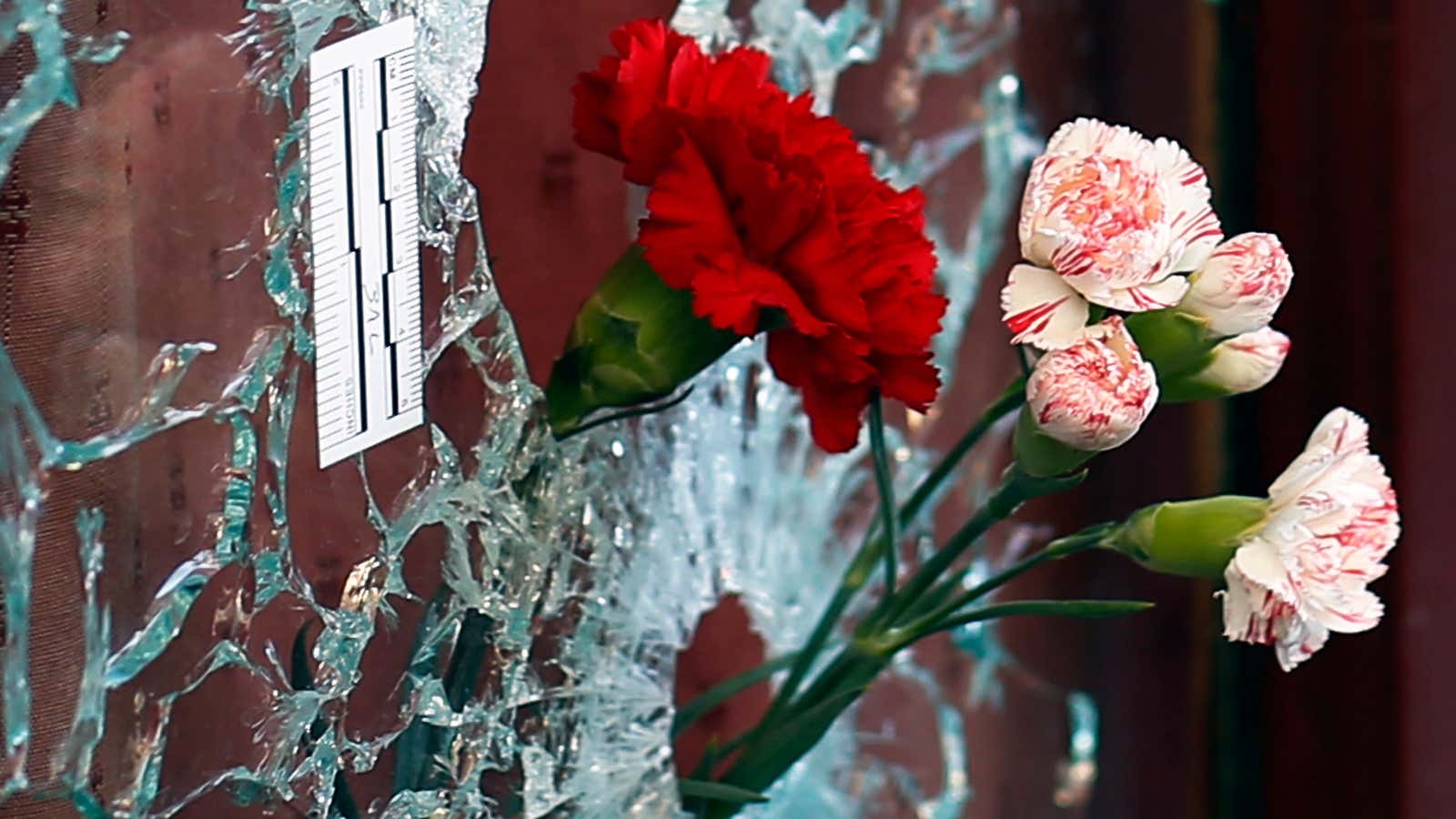Paris
When extremists attacked the Charlie Hebdo offices in Paris earlier this year, I was across town, watching the events unfold on Twitter. The proximity of the attack left me stunned; its scale and brutality were paralyzing. But I was safe. I knew my husband was safe too.
But on Friday night, news of violence in my neighborhood, the 11th arrondissement, left me breathless. I was at home texting with a friend when I glanced at my Twitter feed and spotted an update from journalist Stefan de Vries: “BREAKING: #Paris 3 people wounded after shootout; shooter on the run in the neighborhood around Place de la République.”
My husband was dining with colleagues on the other side of the 11th arrondissement. I texted him warning him to avoid the Place de la République on his way home. The news said the area was being evacuated; shots had been fired. “Sounds bad,” I wrote.
Moments later, I learned that gunmen had opened fire a mere two blocks from where he was dining on Rue de Charonne, at La Belle Equipe. Frantically, I called the restaurant and asked if they were aware of the shootings nearby. They hadn’t heard. The hostess spotted my husband and his colleagues at a table nearby. “Your wife wants to know if you’re alive,” she said with a levity she surely regretted moments later.
Over the next hour, I followed the news anxiously while I waited for my husband to come home. The Place de la République is the major square we pass through daily; Le Petit Cambodge is a Cambodian restaurant I’ve frequented regularly over the years. With a street-side view from my apartment, I stayed perched at my window and watched as locals hurried to get indoors.
By the time my husband and his colleagues left the restaurant, the French military had been deployed and the streets were cordoned off. He ran through the door at 11:30pm, visibly shaken.
“These were drive-by shootings,” he said. “People on terraces or seated by windows in restaurants were easy targets. That could have been me.” We held each other, acutely aware of how lucky he’d been.
By 12:20 am, the police had stormed the Le Bataclan concert venue. I lay in bed crying, scrolling through descriptions and images of terrifying scenes. The terrorists hadn’t targeted controversial figures or anyone of a particular religious affiliation. Their targets were random: anyone who happened to be out celebrating after the end of a long week. I’d felt unsafe after Charlie Hebdo, but we were all at risk now.
The morning after, my husband and I scrolled through messages on texts and emails and social media. Our friends exchanged stories of ‘almosts’—cancelled plans for dinner at Le Petit Cambodge, concert tickets sold at the last minute, head colds that had kept them indoors instead of at La Belle Equipe for drinks.
The French authorities had encouraged Paris residents to stay in their homes, but the streets didn’t stay sleepy for long. My husband and I went outside to find others who had ventured out to the corner bakery or taken their dogs for walks. Neighbors talked with one another in disbelief.
We went to the local market to buy enough food to get us through the weekend. When the cashier blithely wished me “bon weekend,” I nearly burst into tears. When our familiar streets felt like a war zone, an everyday phrase was jarring. I grabbed my bags and hurried home.
In the aftermath of the attacks, we know why terrorists targeted these areas of Paris—chief among them the neighborhoods’ progressive population known for its social, ethnic and religious diversity. On my street alone, there are French, Tunisians, Moroccans, Algerians, Portuguese, Senegalese, Japanese, Chinese, Americans and countless other nationalities who can often be seen sipping coffee together and gossiping on street corners.
The Islamic State and other terrorist groups know that such coexistence is poison to their narrative of social division. And they know how easily an Islamophobic backlash could be ignited, given France’s already tenuous relationship with a swelling immigrant population and a history of barely-veiled contempt for religious Muslims.
“The French Muslim population feels stuck,” said Andrew Aguilar, an American researcher of French Islam at the University of Oxford, when I spoke to him at our favorite local coffee shop Sunday afternoon.
“They’re told to integrate and do what the state wants in certain cases,” he continued, “and then they’re still being told they didn’t integrate enough or being blamed for all of the social ills of society.”
I’d be lying if I said I wasn’t scared about what will happen in Paris and in cities throughout the world in the weeks and months ahead. But more than anything, I am afraid that the attacks will strengthen the anti-Muslim discourse propagated by the extreme right, and that political finger-pointing could exacerbate the internal rifts that ISIS wants to generate.
Parisians aren’t about to stop living. We will keep seeking out comfort in the ways that enrage extremists: in cups of coffee and rounds of drinks at a bar, meals shared with one another in laughter and joy. The bon vivants will still crowd into restaurants and concert halls. My hope is that we will also come together after November 13 as a truly unified nation—refusing to succumb to vitriol and blame, and fighting together against a hateful force that wants to destroy us all.
